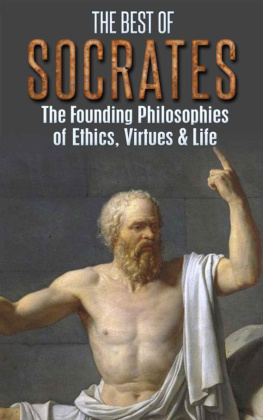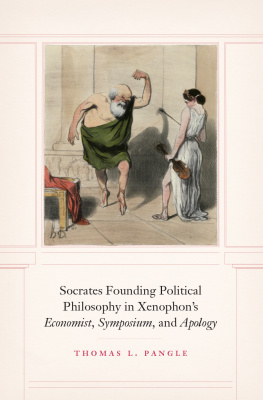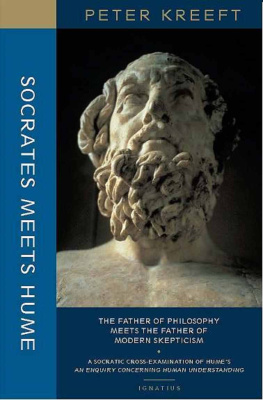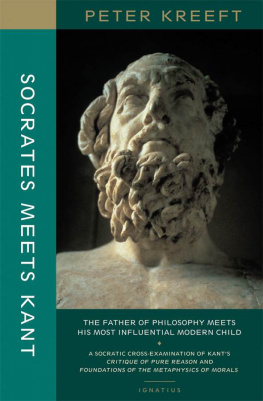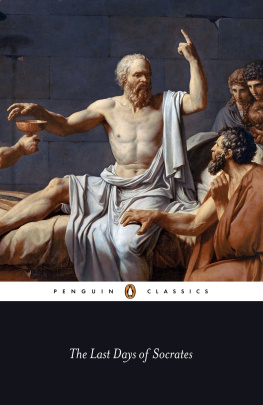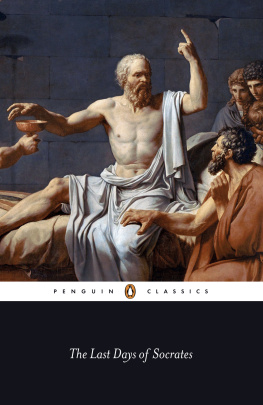The Best of Socrates: The Founding Philosophies of Ethics, Virtues & Life
By Berg Larry
2014 Berg Larry
Table of Contents
Introduction
Wisdom begins with wonder. Socrates
I want to thank you for downloading the book, The Best of Socrates: The Founding Philosophies of Ethics, Virtues & Life.
This book describes the life and beliefs of Socrates, one of the most famous ancient Greek philosophers. He is known in history as one of the worlds greatest teachers and writers. He sets an important example of how to live a virtuous life.
The teachings of Socrates may be old, but they are still meaningful today. In a world where it is easy to forget good virtues due to worldly desires, we all need to be reminded why it is important to preserve our morals values and wise virtues, even if other people seem to be getting more and more cynical and negative every day.
Please feel free to share this book with your friends and family, and please take the time to write a short review on Amazon to share your thoughts.
Chapter 1: The Philosopher in the Agora
I cannot teach anybody anything. I can only make them think. Socrates
Socrates was a philosopher who lived in Athens during the time of the ancient Greeks, around 350 years before the Roman Empire conquered the Greek islands. According to historical accounts, his father was a sculptor or stonecutter and his mother was a midwife. Socrates later learned his fathers trade and made his living the same way.
When he was not working as a stonecutter, Socrates spread his ideas as a philosopher in the market or agora, as it is called in Greek. His friends and disciples gathered around him to hear his thoughts, but unlike some of the other teachers who also called themselves philosophers, he did not receive payment for his teachings. He did not wish to receive payment because he wanted to avoid being associated with fake philosophers who are in it for the money and power. To explain why Socrates did this, we need to understand the situation he lived in.
During that ancient period, Athens was known to have a democratic government, but their democracy is very different from the kind we know today. Since the Greeks lived in city-states where the population is not as large as a modern country, they did not need to elect representatives for the government. Instead, all citizens, i.e. male Athenians, were required to take part in government. Women, on the other hand, were not considered citizens, and were not allowed to take part in any area related to the government; however, Athenian citizens had to be the sons of Athenian women.
A peculiar rule during that time was that they did not have lawyers, but had to defend themselves if ever they were accused of anything. The fake philosophers set up schools teaching rhetoric, or the art of discourse. The lessons here focused on being able to argue well for your side, or against the opponents side. The goal is to win the argument regardless of the truth.
Because of this blatant disregard for the truth, those who view philosophy as a way to search for the truth began to call these false teachers rhetoric sophists. The word for wisdom in Greek is sophia, so the term sophist has an ironic meaning. It highlighted the fact that these teachers were not teaching the truth, but how to bend the story to get away with a fault.
There were already a number of philosophers who were known in ancient Greece during Socrates time, but most of these people focused on what was then called natural philosophy, which tried to determine the origins of the Earth and the universe. Socrates was one of the first who focused on virtue or moral living.
Socrates gained his followers by presenting a different view. He showed that it is desirable to live a life according to good virtues. He considered that the aim of philosophy is to care for the soul.
Since Socrates made fun of the sophists, it was to be expected that he would make some enemies. In time, they found something serious to accuse him of. He was said to be a critic of democracy and was guilty of teaching immorality. His defense for himself was described by Plato in The Apology, and it was here that he showed the faults of Athenian justice. In the end, Socrates was considered guilty. He accepted the sentence of death instead of escaping.
Most of the details of Socrates life and beliefs were described by Plato in his Dialogues, leading to some people having difficulty differentiating between Socratess ideas from Platos. It became more difficult considering that Plato shared his ideas through the Dialogues where Socrates also took part in the discussion. To clarify this, we need to explain why Plato wrote in this way.
Both Socrates and Plato believed that a study of philosophy should encourage a student to think of himself. As such, Plato wrote his lessons in the form of Dialogues where characters based on real people exchange views on a chosen topic. The reader is supposed to imagine taking part in this discussion (albeit he is not able to say his thoughts), and come to his own conclusions. Although Plato had his own conclusions that were made obvious when one reads the Dialogues, the fictional discussion usually ends up inconclusive, e.g. the participants admit that they cannot come up with a conclusive answer and may need more time to think about it. We must understand that the Dialogues do not necessarily describe actual discussions, although they may be based on actual events.
So how do we distinguish between Socrates ideas and Platos? Generally, most academics believe that the early Dialogues that talk about virtues describe Socrates ideas. The later Dialogues that discuss more complex topics like knowledge and politics are considered to describe Platos ideas.
Regardless of whether the Dialogues discuss Socrates original ideas or Platos, they express these concepts through what is to be known as the Socratic Method. This involves an exchange of questions and answers between those participating in the dialogue. During their discussion, Socrates opponent ends up questioning his own initial beliefs.
The Socratic Method proceeds like this:
Socrates: What is X?
Other person: X is A, B, and C.
Socrates: Why is X A? Why B? Why C?
Other person: Because D, E, F.
This continues until everything that can be questioned about the other persons beliefs is asked. Of course, one uses logical reasoning to argue ones point and not simply rhetoric. Philosophy cannot be characterized by the use of emotions, flowery language, and other methods of rhetoric. It cannot support arguments based on fallacies. It must always follow the rules of logic and correct reasoning based on facts or the truth.
To further clarify this, consider Socrates epistemology or his theory of knowledge. For him, knowledge is justified true belief, i.e. it is a true belief that has been given good reason for being true. This is a complex idea which requires a lengthy discussion because it is possible to disagree on what constitutes correct justification. Is it a logical argument? Is it having intense feelings connected to that belief? For Socrates and other philosophers, the correct justification has always been logic. No one who says his beliefs are true because he feels intensely about them has ever been considered a philosopher by the ancient Greeks.
What usually results from the Socratic Method is that a questionable belief is proved incorrect because the illogical reasoning or premises are uncovered. We need to keep this in mind when learning about Socrates ideas. Even when this book lists down the most important lessons, to stay true to Socrates wisdom, we still need to ask if Socrates has indeed taught the truth. That way, we learn to think critically instead of simply accepting what other people tell us. After all, accepting blindly is the easiest way to believe in falsehoods.
Next page
